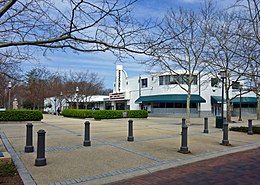
Back غرينبيلت Arabic جرينبيلت ARZ قرینبلت، مریلند AZB Грынбелт (Мэрыленд) Byelorussian Greenbelt Catalan Гринбелт (Мэриленд) CE Greenbelt CEB Greenbelt, Maryland Welsh Greenbelt DAG Greenbelt German
Greenbelt | |
|---|---|
 Roosevelt Center in March 2011. The city's commercial center typifies the Art Deco style used during the original construction of Greenbelt. | |
 Location in Prince George's County and Maryland | |
 | |
| Coordinates: 38°59′41″N 76°53′07″W / 38.9946701°N 76.8853989°W[1][2] | |
| Country | United States |
| State | Maryland |
| County | Prince George's |
| Incorporated | June 1, 1937[3] |
| Government | |
| • Mayor | Emmett V. Jordan (D) |
| Area | |
• Total | 6.29 sq mi (16.29 km2) |
| • Land | 6.24 sq mi (16.15 km2) |
| • Water | 0.06 sq mi (0.14 km2) 0.99% |
| Elevation | 157 ft (48 m) |
| Population (2020) | |
• Total | 24,921 |
| • Density | 3,996.95/sq mi (1,543.35/km2) |
| Time zone | UTC−05:00 (Eastern) |
| • Summer (DST) | UTC−04:00 (Eastern) |
| ZIP Codes | 20768, 20770–20771 |
| Area codes | 301 & 240 |
| FIPS code | 24-34775 |
| GNIS feature ID | 2390596 |
| Website | www |
Greenbelt is a city in Prince George's County, Maryland, United States, and a suburb of Washington, D.C.[1][2] At the 2020 census, the population was 24,921.[5]
Greenbelt is the first and the largest of the three experimental and controversial New Deal Greenbelt Towns, the others being Greenhills, Ohio, and Greendale, Wisconsin. Greenbelt was planned and built by the federal government as an all-white town.[6][7] The cooperative community was conceived in 1935 by Undersecretary of Agriculture Rexford Guy Tugwell, whose perceived collectivist ideology attracted opposition to the Greenbelt Towns project throughout its short duration.[8][7] The project came into legal existence on April 8, 1935, when Congress passed the Emergency Relief Appropriation Act of 1935.[9][8] Under the authority granted to him by this legislation, President Franklin D. Roosevelt issued an executive order, on May 1, 1935, establishing the United States Resettlement Administration (RA/RRA).[8]
First called Maryland Special Project No. 1, the project was officially named Greenbelt when the Division of Suburban Resettlement of the Resettlement Administration began construction, on January 13, 1936, about eight miles north of Washington.[7] The complete Greenbelt plans were reviewed at the White House by President Roosevelt and First Lady Eleanor Roosevelt on April 30, 1936.[7] The first tenants, after selection in a stringent application process, moved in to the town on September 30, 1937.[7] The construction consisted of structures built in the Art Deco, Streamline Moderne, and Bauhaus architectural styles.[7]
Greenbelt is credited as a historic milestone in urban development because it was the initial model for the privately constructed suburban Washington, D.C., planned cities of Reston, Virginia, and Columbia, Maryland.[7]
The original federally built core of the city, known locally as Old Greenbelt, was recognized as the Greenbelt Historic District by the Maryland Historical Trust, and is listed on the National Register of Historic Places as a National Historic Landmark District.
Greenbelt's population, which includes residents of privately built dwellings dating from after the end of the federal government's ownership of the city, was recorded as 23,068 at the 2010 U.S. Census and 24,921 at the 2020 census.[5]
- ^ a b "TIGERweb 5.0 - Greenbelt city, internal point latitude and longitude". United States Census Bureau, Geography Division / Esri. Archived from the original on September 14, 2018. Retrieved October 2, 2018.
- ^ a b "State of Maryland Incorporated Places - Current/ACS18 - Data as of January 1, 2018". tigerweb.geo.census.gov. Retrieved October 2, 2018.
- ^ Larsen, Christian L.; Andrews, Richard D. (1951). "I: Origin and Growth". The Government of Greenbelt. Studies in Public Administration. College Park: Bureau of Public Administration, College of Business and Public Administration, University of Maryland. pp. 1–8. hdl:2027/uc1.b3526707. OCLC 551390464.
- ^ "2020 U.S. Gazetteer Files". United States Census Bureau. Retrieved April 26, 2022.
- ^ a b "Greenbelt city, Maryland". United States Census Bureau. Retrieved April 15, 2022.
- ^ Loewen, James W. (2018). Sundown towns: a hidden dimension of American racism (2018 ed.). New York. pp. 112–113. ISBN 978-1-62097-434-6. OCLC 1029803624.
{{cite book}}: CS1 maint: location missing publisher (link) - ^ a b c d e f g Williamson, Mary Lou (1987). Phillips, Nancy O. (ed.). Greenbelt: History of a New Town, 1937-1987. Norfolk, VA: Donning Co. pp. 1–43. hdl:2027/mdp.39015061000652. ISBN 978-0-8986-5612-1. OCLC 607530163.
- ^ a b c "Franklin D. Roosevelt: Executive Order 7027 Establishing the Resettlement Administration". The American Presidency Project. Archived from the original on September 13, 2018. Retrieved September 13, 2018.
- ^ "Today in History - April 8". The Library of Congress. Archived from the original on September 3, 2018. Retrieved September 13, 2018.


